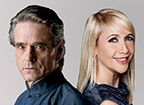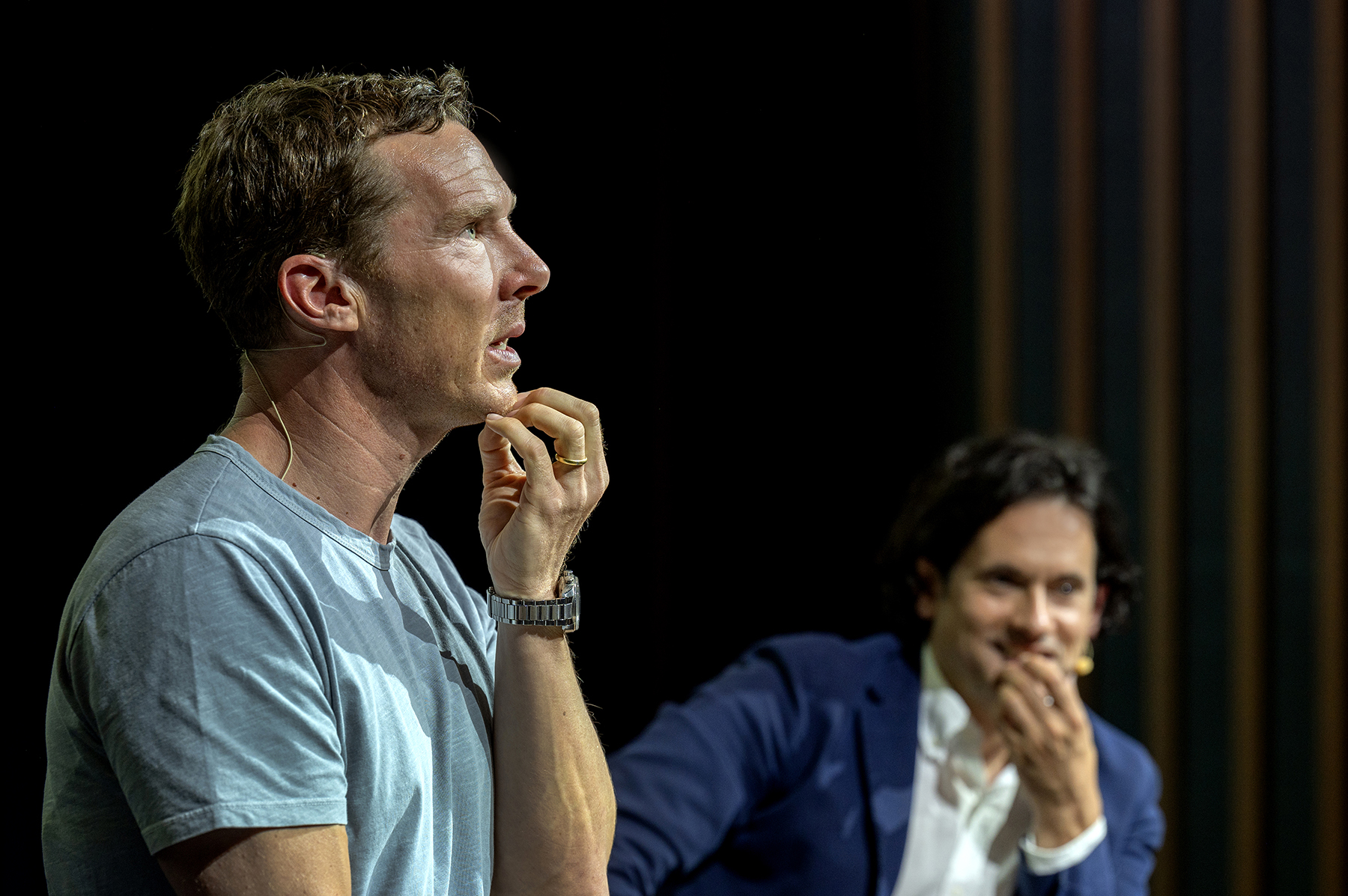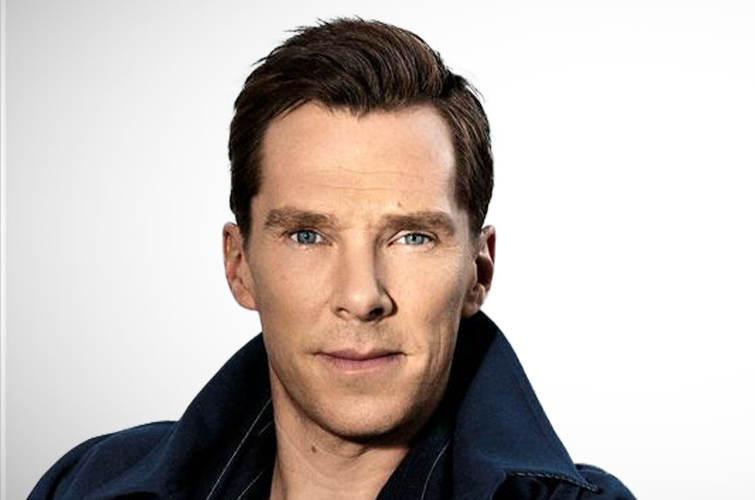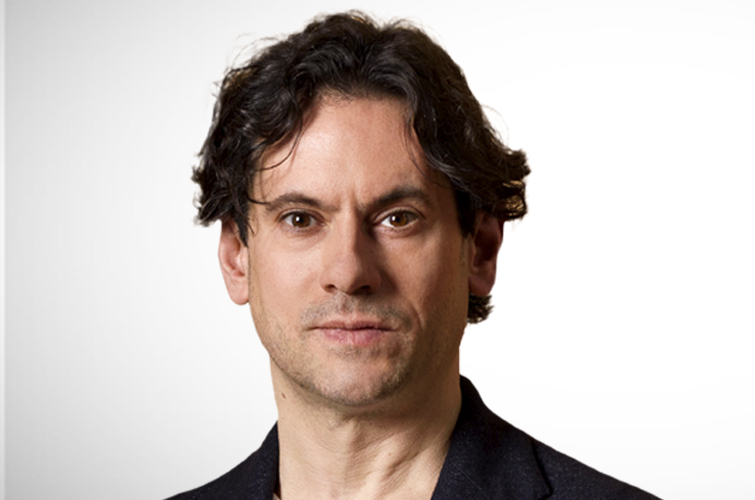Event Summary
Benedict Cumberbatch was on expansive form at the AH/JW3 Speaker Series, talking about everything from Alan Turing to the Amazon, from Sherlock to rewilding farmland. In a nuanced and articulate exchange with the art curator and adviser, Nick Hackworth, he talked about the challenges and inspirations that have shaped him, as well as one of the more eccentric gifts he’s been sent by a fan.
Hackworth opened the conversation with a question about why Cumberbatch is repeatedly drawn to roles that portray outsiders including Phil Burbank in The Power of the Dog, Alan Turing in The Imitation Game and Dominic Cummings in Brexit: The Uncivil War. Cumberbatch replied that he had several different motivations. While there was a basic attraction to exploring psychologies that are ‘less understood’ or ‘fresh terrain’ he has also come to realise that his status as an only child has made him interested in people who don’t automatically fit in.
‘I think a lot of people – especially around adolescence – can relate to that search for your tribe,’ he said. ‘That goes quite deep.’ He explained that another part of the appeal for him was to ‘find a kinship with a character and then give them a platform and a narrative that they may not have had in their lifetime.’
Hackworth cited the American writer and mythologist Joseph Campbell’s theory of the hero’s journey – or the monomyth. This traces the archetypal progress of a leading character starting with ‘the call to adventure’ and going through different crises and challenges until they return home transformed. He gave examples of how this pattern played out in movie cycles including Star Wars and Lord of the Rings. While Cumberbatch agreed that this model worked for epic-style films, specifically invoking The Hobbit, he was also keen to discuss roles where the resolution was not so neat.
‘For Turing you have the irony of a man who helped achieve freedom during a potential fascist takeover of the country [through cracking the Enigma Code in World War II] who was then treated in an incredibly fascistic way,’ he said. ‘He has his sexuality punished and altered chemically. That’s not the end of a hero’s journey, that’s a tragedy. Yet he is a hero. That complexity is integral to the film.’
“That’s not the end of a hero’s journey, that’s a tragedy. Yet he is a hero. That complexity is integral to the film.”
Beyond this, Cumberbatch pointed out, you don’t need to be an outsider to begin with to have an interesting narrative trajectory. He talked about The Mauritanian, the 2021 legal drama in which he played Marine Prosecutor Stuart Couch, a committed Christian and American patriot, who challenges the system when he realises that the Muslim prisoner he is dealing with has given evidence through torture.
Couch has been asked to prosecute Mohamed Ould Slahi as a 9/11 suspect, but because of his beliefs he decides that the process is – as Cumberbatch declared – ‘undemocratic, unconstitutional, unChristian and inhuman’. He continued, ‘So he then becomes ostracised through his own actions, by stepping away. It’s not just odd characters, it’s the odd actions of ordinary characters that interest me.’
He spent some time talking about his work on Jane Campion’s The Power of the Dog. ‘When you’ve got someone as gifted as Jane Campion directing through the lens of Ari Wegner’s cinematography in that kind of landscape, that’s a gift,’ he declared. ‘In truth that’s what you crave’.
When asked whether it was true he didn’t wash on set, after replying in mock outrage ‘How dare you!’ he clarified, ‘I didn’t wash my clothes.’ Though he then admitted, ‘I didn’t wash for a weekend, it was pretty tough – it was before my family arrived, I don’t think I could have done it with them around. He joked that at one point, Campion had said ‘Let’s go for sushi!’, confronting him with the nightmare scenario of going to a place where there would be tourists and people who recognised him ‘and people obsessing online what I smell like, and then I drift in smelling like a skunk.’ Even so he accepted and lived to tell the tale.
When it came to the audience members’ turn to ask questions, he said there were no plans for another Sherlock series in the pipeline, ‘but never say never’. Asked what the strangest present was that he’d ever been sent by a fan, he replied to general amusement, ‘a spanking bat’.
Right at the end Cumberbatch was asked about the work he was doing – in collaboration with Nick Hackworth – on AmazoniAlerta, an NGO that works in Brazil to advance the legal defence of indigenous people’s lands and rights. He encouraged people to engage with the project and, if they wanted, to donate through the website, though he also emphasised that ultimately it was about the empowerment of indigenous people who are ‘stewards of the Earth’.
‘One of the things that’s most alarming,’ he said, ‘is when you meet the experts who really have a sense of urgency about the seriousness of the multiple environmental crises that are facing us now. Yet there’s a huge disconnect between what they’re warning about and what people are doing. That’s human nature to an extent. But we need to bridge it as much as we can.’
Event Videos
Event Photographs
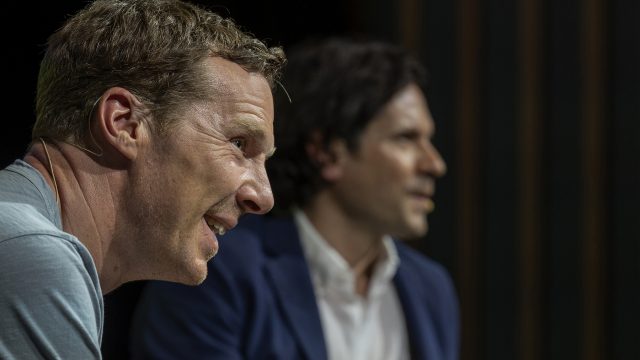
Featuring
Benedict Cumberbatch
Academy Award Nominee Benedict Cumberbatch recently garnered awards for his performance as Phil Burbank in Jane Campion's lauded film 'The Power Of The Dog'.
Nick Hackworth
Nick Hackworth is an art writer and curator. He is Director of Modern Forms, a private collection and curatorial platform founded by collector Hussam Otaibi and co-founder of Paradise Row Projects a non-profit arts organisation.
Biography
